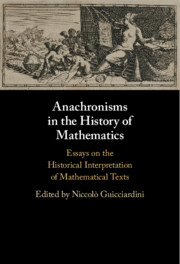 Anachronisms in the History of Mathematics
Anachronisms in the History of Mathematics Published online by Cambridge University Press: 19 July 2021
The historiography of mathematics in the Renaissance involves two kinds of anachronism. First, the tendency to anachronism in the authors themselves, whose understanding of broad historical structures and of the development of mathematics may be colored by concerns of their own time. And second, our anachronism in reading these histories of mathematics as if they were attempting precisely the same thing as modern historians of mathematics. This article focuses on the author of the first modern work dedicated to the history of mathematics, Petrus Ramus (1515–1572), singling out three occasions in which his historical account seems to diverge widely from that of modern historians, and examining them in the light of both types of anachronism. First, in his account of the development of mathematics in the early Platonic Academy; second, his assessment of Eudoxus of Cnidus; and finally in his dating of the Neoplatonic philosopher and commentator on Euclid, Proclus.
To save this book to your Kindle, first ensure no-reply@cambridge.org is added to your Approved Personal Document E-mail List under your Personal Document Settings on the Manage Your Content and Devices page of your Amazon account. Then enter the ‘name’ part of your Kindle email address below. Find out more about saving to your Kindle.
Note you can select to save to either the @free.kindle.com or @kindle.com variations. ‘@free.kindle.com’ emails are free but can only be saved to your device when it is connected to wi-fi. ‘@kindle.com’ emails can be delivered even when you are not connected to wi-fi, but note that service fees apply.
Find out more about the Kindle Personal Document Service.
To save content items to your account, please confirm that you agree to abide by our usage policies. If this is the first time you use this feature, you will be asked to authorise Cambridge Core to connect with your account. Find out more about saving content to Dropbox.
To save content items to your account, please confirm that you agree to abide by our usage policies. If this is the first time you use this feature, you will be asked to authorise Cambridge Core to connect with your account. Find out more about saving content to Google Drive.